When choosing the right CMS for your website or business in 2025, two options stand out: WordPress and Sanity.io. Both offer unique advantages depending on your business needs. WordPress is a traditional, widely-used CMS, while Sanity.io is a modern, headless CMS that’s gaining traction for its flexibility and developer-friendly features.
In this guide, we’ll explore the differences between WordPress and Sanity.io based on various features and requirements.
Overview of WordPress
WordPress is the most widely used CMS globally, powering over 40% of websites. It is an open-source, highly flexible platform with a massive plugin ecosystem and thousands of themes to customize your site.
Key Features:
-
Open-source and community-driven
-
User-friendly interface
-
A vast collection of themes and plugins
-
Strong SEO capabilities through plugins like Yoast SEO and Rank Math
-
Extensive community support and resources
-
Easy to set up and maintain for beginners
Overview of Sanity.io
Sanity.io is a headless CMS designed to provide content as a service. It is API-first, meaning content is managed and delivered through APIs, making it ideal for developers looking for full control over content and design across multiple platforms, from websites to mobile apps.
Key Features:
-
Headless, API-first architecture
-
Real-time content updates via APIs
-
Highly customizable content modeling
-
Powerful query language (GROQ) for retrieving content
-
Supports multiple platforms, from websites to mobile apps and IoT
-
Collaboration features for teams and content editors
Feature Comparison Table
| Feature | WordPress | Sanity.io |
|---|---|---|
| Type of CMS | Traditional CMS | Headless CMS |
| Ease of Use | Beginner-friendly | Developer-oriented |
| Customization | High (themes & plugins) | Very High (via APIs & queries) |
| SEO Capabilities | Excellent with plugins | Manual setup through custom front-end |
| Content Flexibility | Moderate | Very High |
| Performance | Depends on setup/plugins | Fast and scalable via CDN |
| Security | Depends on regular updates | Built-in security & cloud hosting |
| Community & Support | Large open-source community | Developer-focused community |
| eCommerce Support | WooCommerce & other plugins | Third-party integrations required |
| Cost | Free core + premium addons | Free plan available, tiered pricing for enterprise |
Ease of Use
WordPress:
WordPress is extremely user-friendly, offering a dashboard that’s easy for beginners to navigate. With just a few clicks, users can install plugins, change themes, and add new content.
Sanity.io:
Sanity.io requires technical knowledge. The platform is developer-focused, allowing for the creation of custom content structures via APIs. It is highly flexible but has a steeper learning curve compared to WordPress.
Winner: WordPress (for ease of use)
Performance
WordPress:
WordPress performance depends on the hosting, themes, plugins, and caching configurations. While it can be fast, performance may require optimization using caching plugins and Content Delivery Networks (CDNs).
Sanity.io:
Sanity.io is built for speed and scalability. Content is delivered through a global CDN, ensuring fast performance even at scale, with real-time content updates via APIs.
Winner: Sanity.io (for speed and scalability)
SEO Capabilities
WordPress:
WordPress has strong SEO capabilities, with plugins like Yoast SEO and Rank Math making it easy to manage on-page SEO, meta tags, sitemaps, and more.
Sanity.io:
Sanity.io offers flexibility, but SEO setup must be done manually via the custom front-end. While it offers great flexibility, SEO management requires more effort and technical setup.
Winner: WordPress (for ease of SEO setup)
Customization and Flexibility
WordPress:
WordPress is highly customizable with thousands of plugins and themes, allowing you to add any functionality or design elements you need. However, customization may be limited by the available plugins.
Sanity.io:
Sanity.io offers ultimate flexibility, allowing developers to define how content is structured and delivered across various platforms. With full control over the front-end and backend, it is highly adaptable for complex use cases.
Winner: Sanity.io (for full customization)
Security
WordPress:
WordPress requires regular maintenance to ensure security, such as updating plugins and themes. If not properly maintained, WordPress sites can be vulnerable to attacks.
Sanity.io:
Sanity.io is a cloud-based solution with built-in security protocols. It automatically handles security updates, offering a more secure environment out-of-the-box compared to WordPress.
Winner: Sanity.io (for built-in security)
Cost and Licensing
WordPress:
WordPress itself is free, but you’ll incur costs for hosting, premium themes, plugins, and possibly a developer to customize it. These costs vary based on the size of the project.
Sanity.io:
Sanity.io offers a free plan with limited features, and the paid plans are tiered based on the scale of usage. Costs increase as you scale or require more advanced features.
Winner: WordPress (for cost-effectiveness for smaller sites)
eCommerce Compatibility
WordPress:
WordPress has robust eCommerce support, particularly with WooCommerce, one of the most popular eCommerce plugins. It’s easy to set up an online store with multiple payment gateways and plugins.
Sanity.io:
Sanity.io does not have built-in eCommerce capabilities. It can integrate with third-party solutions like Shopify, Snipcart, or custom eCommerce systems, but it requires more development effort.
Winner: WordPress (for built-in eCommerce support)
Community and Support
WordPress:
WordPress has a massive global community with numerous forums, tutorials, documentation, and third-party support, making it easy for beginners and professionals to find help.
Sanity.io:
Sanity.io is more developer-focused with a smaller, but dedicated, community. It offers detailed documentation and a support system geared toward developers building custom solutions.
Winner: WordPress (for community support)
Conclusion: Which CMS Should You Choose?
| Criteria | Best Choice |
|---|---|
| For Beginners | WordPress |
| For Developers | Sanity.io |
| For eCommerce Sites | WordPress |
| For Multi-Channel Projects | Sanity.io |
| For Budget-Conscious Users | WordPress |
| For Performance at Scale | Sanity.io |
Final Verdict:
Choose WordPress if you need an easy-to-use platform with lots of plugins, themes, and ready-to-go solutions for blogs, websites, and eCommerce. It’s the best choice for small businesses and individuals who want a fast, cost-effective setup.
Choose Sanity.io if you’re building large-scale applications or need full control over your content and delivery across multiple platforms. It’s ideal for developers and enterprises looking for a highly customizable, scalable, and secure CMS.
FAQs: WordPress vs Sanity.io
1. Is WordPress easier to use than Sanity.io?
Yes, WordPress is much more user-friendly and ideal for non-developers, while Sanity.io requires technical skills and is better suited for developers.
2. Can Sanity.io be used for blogging?
Yes, Sanity.io can be used for blogging, but you will need to build the front-end separately. WordPress offers a more out-of-the-box blogging experience.
3. Which CMS is more secure?
Sanity.io offers enterprise-grade security as a cloud-based solution, while WordPress requires manual updates and maintenance for security.
4. Is Sanity.io free?
Sanity.io offers a free plan with limitations. Paid plans are available for larger teams and enterprises.
5. Can I use Sanity.io for eCommerce?
Sanity.io does not have built-in eCommerce features, but it can integrate with third-party services like Shopify for custom eCommerce solutions.
6. Which CMS is better for SEO?
WordPress is generally better for SEO out-of-the-box thanks to plugins. Sanity.io offers more flexibility but requires custom setup for SEO.
The world’s First zero commission platform
Hire tech partners effortlessly
 If you're a non-tech founder looking for an agency or a tech founder looking for engineers.
If you're a non-tech founder looking for an agency or a tech founder looking for engineers. You can get your 5 best matches from 2800 in 5 mins, with 1000 data points tracked.
You can get your 5 best matches from 2800 in 5 mins, with 1000 data points tracked. Connect directly with no credit card needed!
Connect directly with no credit card needed!
You’re just a click away from the best talent.


 Reading time: 6 minute(s)
Reading time: 6 minute(s) 

